Unit 1 Dream Homes 单词与词组用法 课件(共36张PPT,无音频,WPS打开)
文档属性
| 名称 | Unit 1 Dream Homes 单词与词组用法 课件(共36张PPT,无音频,WPS打开) |
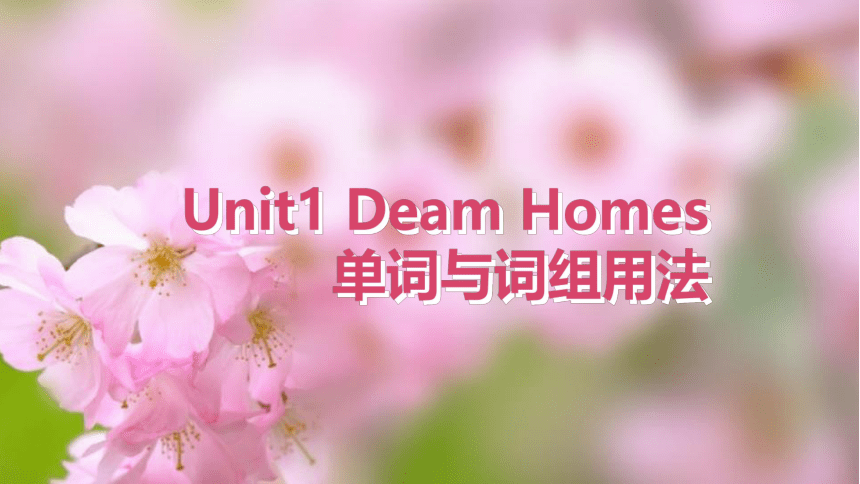
|
|
| 格式 | zip | ||
| 文件大小 | 3.0MB | ||
| 资源类型 | 教案 | ||
| 版本资源 | 牛津译林版 | ||
| 科目 | 英语 | ||
| 更新时间 | 2020-06-27 00:00:00 | ||
图片预览



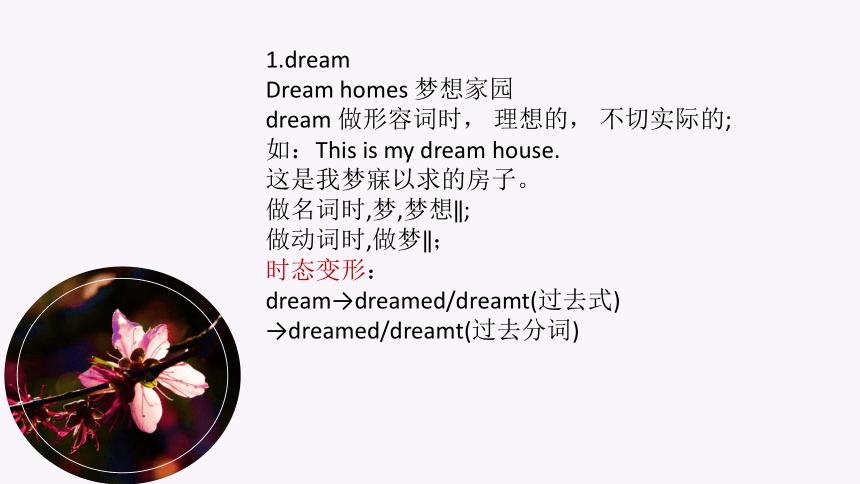

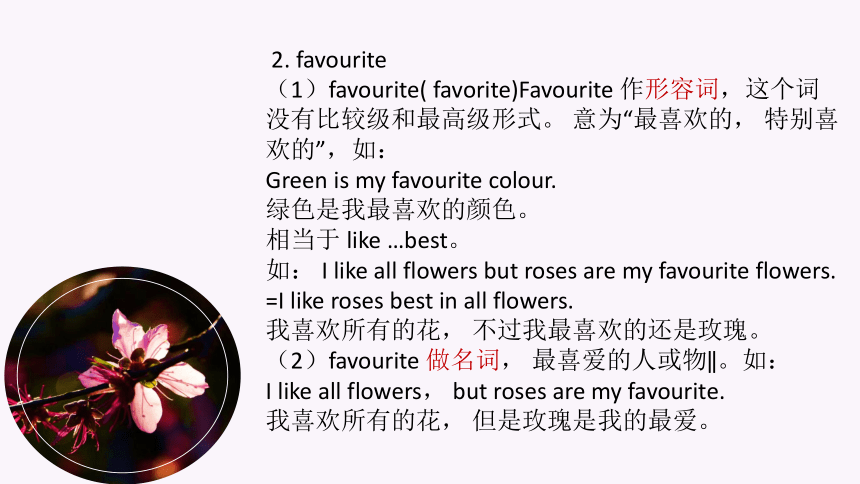

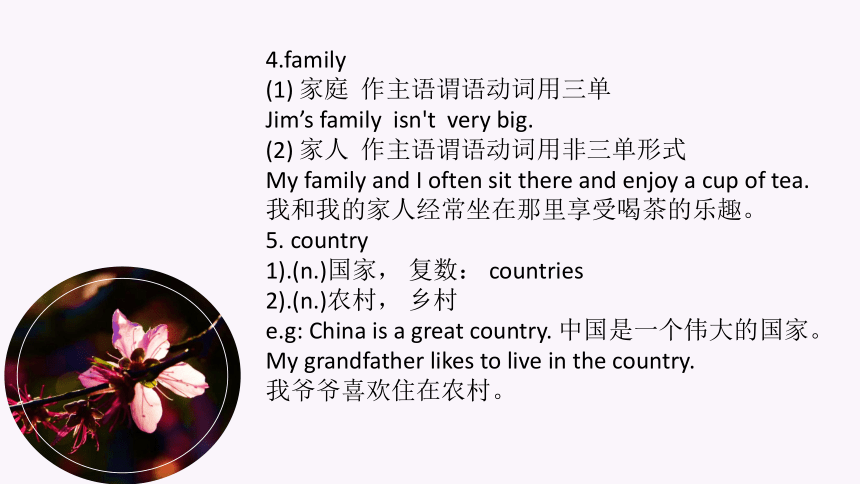
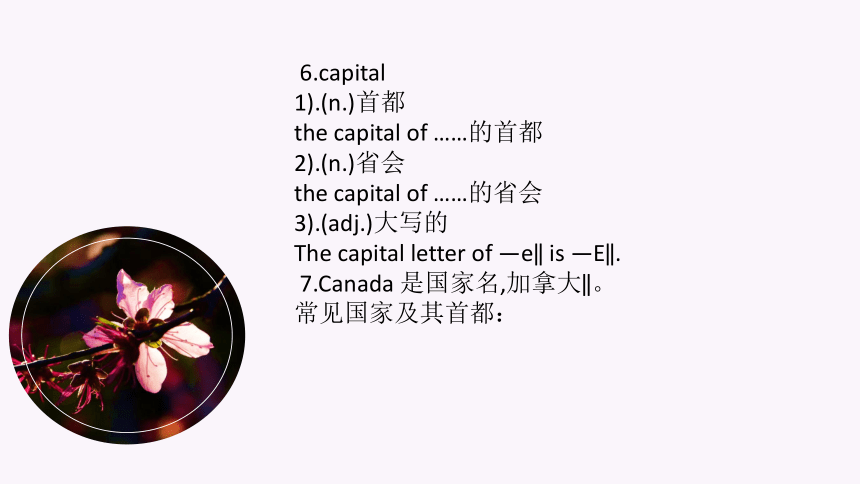
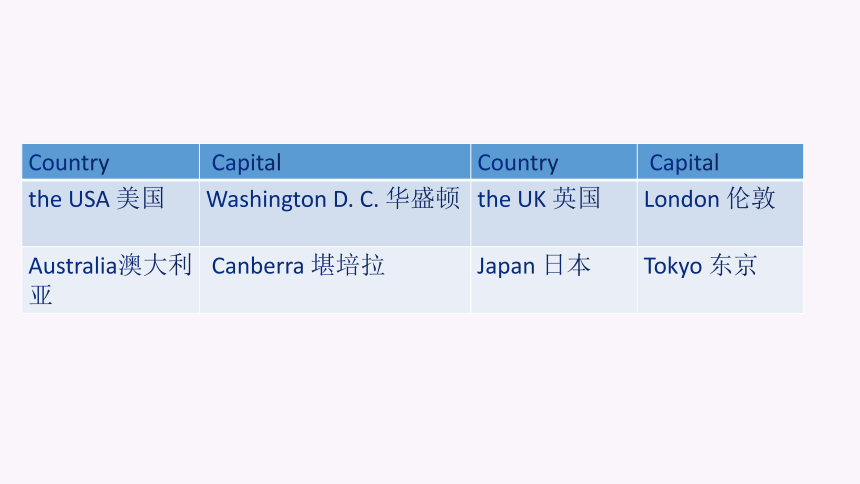
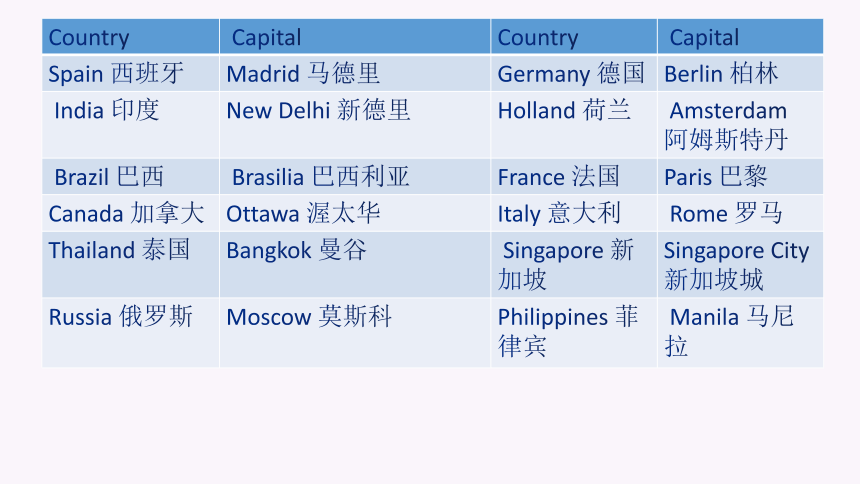
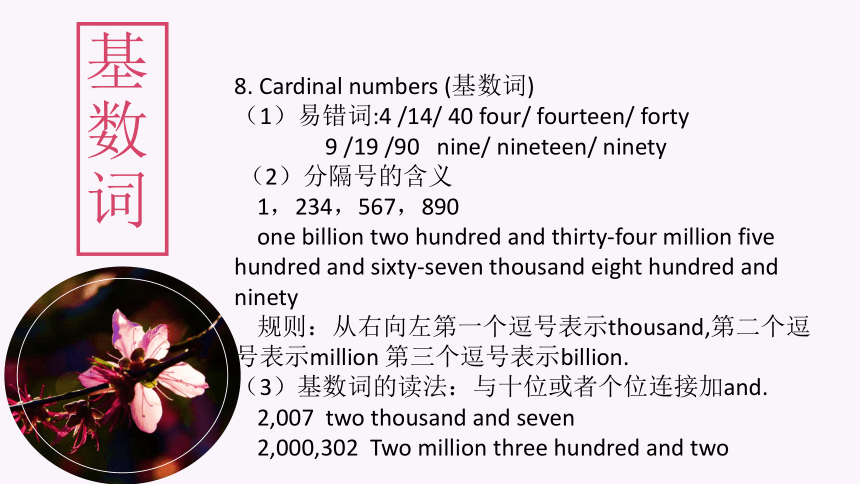
文档简介
(共36张PPT)
Unit1
Deam
Homes
单词与词组用法
目录\
Contents
词组用法
单词用法
Part
01
单词用法
1.dream
Dream
homes
梦想家园
dream
做形容词时,
理想的,
不切实际的;
如:This
is
my
dream
house.
这是我梦寐以求的房子。
做名词时,梦,梦想‖;
做动词时,做梦‖;
时态变形:
dream→dreamed/dreamt(过去式)
→dreamed/dreamt(过去分词)
做动词时,常用于以下结构:
dream
of...梦到....
dream
to
do
sth.梦想做某事。
如:I
dreamed
of
my
English
teacher
last
night.
昨晚我梦到了我的英语老师。
Amy
dreams
to
be
a
singer
when
she
grows
up.
埃米梦想长大后成为一名歌手。
?2.
favourite
(1)favourite(
favorite)Favourite
作形容词,这个词没有比较级和最高级形式。
意为“最喜欢的,
特别喜欢的”,如:
Green
is
my
favourite
colour.
绿色是我最喜欢的颜色。
相当于
like
…best。
如:
I
like
all
flowers
but
roses
are
my
favourite
flowers.
=I
like
roses
best
in
all
flowers.
我喜欢所有的花,
不过我最喜欢的还是玫瑰。
(2)favourite
做名词,
最喜爱的人或物‖。如:
I
like
all
flowers,
but
roses
are
my
favourite.
我喜欢所有的花,
但是玫瑰是我的最爱。
拓展:
动词
prefer
意为“更喜欢”,
相当于
like…better。
如:
I
prefer
football。
=I
like
football
better。
我更(比较)喜欢足球。
3.one
&
it
one?:
(1)基数词
——序数词
first
?
?
?
?
?(2)代词???
代替上文提到的同类人或物中的一个(同类不同一;复数为ones.)
It?:代词,指代的上文提到的那个事物?
(同类且同一)
4.family
(1)
家庭?
作主语谓语动词用三单
Jim’s
family??isn't??very
big.
(2)
家人?
作主语谓语动词用非三单形式
My
family
and
I
often
sit
there
and
enjoy
a
cup
of
tea.
我和我的家人经常坐在那里享受喝茶的乐趣。
5.
country
1).(n.)国家,
复数:
countries
2).(n.)农村,
乡村
e.g:
China
is
a
great
country.
中国是一个伟大的国家。
My
grandfather
likes
to
live
in
the
country.
我爷爷喜欢住在农村。
6.capital
1).(n.)首都
the
capital
of
……的首都
2).(n.)省会
the
capital
of
……的省会
3).(adj.)大写的
The
capital
letter
of
―e‖
is
―E‖.
7.Canada
是国家名,加拿大‖。
常见国家及其首都:
Country
Capital
Country
Capital
the
USA
美国
Washington
D.
C.
华盛顿
the
UK
英国
London
伦敦
Australia澳大利亚
Canberra
堪培拉
Japan
日本
Tokyo
东京
Country
Capital
Country
Capital
Spain
西班牙
Madrid
马德里
Germany
德国
Berlin
柏林
India
印度
New
Delhi
新德里
Holland
荷兰
Amsterdam
阿姆斯特丹
Brazil
巴西
Brasilia
巴西利亚
France
法国
Paris
巴黎
Canada
加拿大
Ottawa
渥太华
Italy
意大利
Rome
罗马
Thailand
泰国
Bangkok
曼谷
Singapore
新加坡
Singapore
City
新加坡城
Russia
俄罗斯
Moscow
莫斯科
Philippines
菲律宾
Manila
马尼拉
8.?Cardinal
numbers
(基数词)
(1)易错词:4
/14/
40
four/
fourteen/
forty?????
????????????????9
/19
/90??
nine/
nineteen/
ninety
(2)分隔号的含义
????1,234,567,890??
????one
billion
two
hundred
and
thirty-four
million
five
hundred
and
sixty-seven
thousand
eight
hundred
and
ninety
????规则:从右向左第一个逗号表示thousand,第二个逗号表示million
第三个逗号表示billion.
(3)基数词的读法:与十位或者个位连接加and.
????2,007?
two
thousand
and
seven????????
????2,000,302?
Two
million
three
hundred
and
two
基数词
(4)hundred,
thousand,
million
前有具体的数字时,它们不能加“s”.
hundred,
thousand,
million前无具体数字时,后加”s”和of
表示概数
(5)数词+hundred/thousand/million/billion
of
+the+n.(复数)?
这儿的of表示的是“其中的”
????类似的结构有:Some
of
the
students
其中一些学生,many
of
the
teachers,?许多老师
most
of
the
subjects
大部分的科目,
all
of
the
classrooms
所有教室
基数词
9.Ordinal
numbers
(序数词)
?(1)注意序数词拼写
????a.
1,2,3特殊记,一般?加th,
(first
,second
,third
,
fourth,
seventh,
hundredth)
????b.
8少t
9去e,
ve要用f
替
????c.
ty结尾整数字,y
变ie
也容易
?(2)序数词用来谈论日期、楼层、结果等。
????e.g.March
18th?
三月十八号
序数词
(3)
the/one’s+序数词+n.
表示“第几个…/某人第几…”
序数词前一般要用定冠词,
但是当序数词前有my,
his,her等形容词性物主代词
或this,that等指示代词,则不用再加the.
It's?my
first
time?to?come
to
Beijing???
这是我第一次来北京
(4)a/an+序数词,表示“又一,再一”.
①
Please
give
me
a
second
chance.
请再给我一次机会
②
The
woman
had
a
third
baby.
那位妇女生了第三个宝宝。
序数词
10.other?和some,any,
many,
no等限定词连用时,常放在它们的后面。
如:There
are
no
other
rooms
on
the
second
floor.
三楼没有其他的房间了。
?Ask
some
other
students.
问问别的同学们吧。
11.
each
????(1)
adj.
用作定语,each
+
n.
(单),谓语动词用三单形式。
????(2)
pron.
用作主语/宾语,each
of
the
+
n.
(pl.)。
作主语,谓语动词用三单形式。
????(3)
n.
用作同位语,跟在主语后,谓语动词与主语保持一致。
Each
room
has
a
new
computer.
每个房间都有一台新电脑。
12.
mile??
n.
英里??
1
mile
≈1.6
km??
????表示距离用:A
is
…mile/kilometre
(away)
from
B.
13.?
centre?
n.
中心?
在市中心?
????in
the
centre
of
the
city=
in
the
city
centre
14.
share??
vt.
????
????share
sth
with
sb.
与某人分享、合用某物
15.palace
―皇宫,
宫殿‖,
指古代皇帝的宫殿或主教、
大主教的住宅,
也可表示―豪华住宅‖―公共娱乐大厦‖。
Palace(首字母大写)与
the
连用,
可表示―
宫廷中显要的人‖,
尤指国王或王后,
此时谓语动词用单数形式。
短语拓展:
a
palace
of
culture
文化宫
the
summer
Palace
颐和园
the
Palace
Museum
故宫
a
palace
hotel
豪华宾馆
16.message
Can
I
take
a
message?需要我传个话吗?
message
为可数名词,意思是“消息,音信”,常用短语有:take
a
message
传个话,捎个口信;leave
a
message
留口信,
留言。
Could
you
take
a
message
to
my
brother
,
please?请你把这个消息带给我兄弟好吗?
I
left
a
message
on
your
answering
machine.
我在你的电话应答机上留言了。
17.invite用作动词,
意为“邀请”
I
would
like
to
invite
my
friends
to
watch
films
with
me
at
the
weekend.
我想邀请我的朋友们周末和我一起看电影。
常用结构有:invite
sb.
to...意为“邀请某人......”
;
invite
sb.
to
do
sth.意
为“邀请某人做某事”。
Have
you
been
invited
to
their
party?
你被邀请去他们的聚会了吗?
Why
not
invite
her
to
come
here?
为什么不邀请她来这儿?
invitation
是名词,
意思是“(口头或书面的)邀请”,
单词的读音以元音音素开头,
故要与冠词
an
连用。
常用结构有
an
invitation
t....
,意为“..的邀请”。
an
invitation
to
the
party
参加聚会的邀请
反身代词
我自己
你自己
他自己
她自己
它自己
我们自己
你们自己
他/她/它们自己
myself
yourself
himself
herself
itself
ourselves
yourselves
themselves
18.
Part
02
词组用法
1.arrive
in
+?大地点(范围内)??
我将在周六到达上海。
I
am
arriving
in
Shanghai
on
Sunday.?
????=I
will?arrive
in?Shanghai
on
Sunday?
????=
I
will?get
to?Shanghai
on
Sunday
????=I
will?reach?Shanghai
on
Sunday.
arrive
at
+?小地点(具体地点)?
?
当后接地点副词here,
there
,home时要省略介词
?get
home?到家(也要省略介词to)??当后无到达地点时,只用arrive而不用reach或get
?e.g.When
will
they
arrive
tomorrow??他们明天什么时候到达?
2.look
out
at
the
beach向外看着海滩
(1)Look
out
!
=Be
careful!
=
Take
care!
当心/小心
(2)
look
out“向外看/眺望外面”,后接宾语要用介词。
?
look
out
of
the
window/the
door????向窗/门外看?
?
look(out)
at
the
tree(向外)???看着那棵树
look
out
of
sth.
at
sth.从某处向外看着某人/物
3.
the
best
place
to
chat
and
watch
TV
一个聊天和看电视的最好的地方
????to
chat
and
watch
TV
动词不定(to
do)作后置定语
4.
ask
sb
(not
)
to
do
sth
叫某人(不要)做某事
Ask
them
to
come
here.
5.
have
fun
(playing)with
my
dog
????have
fun
doing
sth.=have
a
good/great
time
doing
sth.?
做某事很开心
????have
fun=
enjoy
oneself
=have
a
good
time(donging)
玩得开心,过得愉快
oneself
某人自己
It
is
great
fun
to
do
sth.
=have
fun
doing
sth.做某事很有趣。
fun为不可数名词。
6.
my
own
bedroom=a
bedroom
of
my
own
我自己的卧室
????have
one’s
own+n.=have
+n.+of
one’s
own
拥有某人自己的某物
see
sth.
with
one’s
own
eyes?
亲眼所见
7.next
to
―紧挨着,
在……的旁边,
其后可接表示地点的名词或代词。
No,
I’d
like
to
live
next
to
a
restaurant.
不,
我想要住在隔壁的饭店里。
e.g:
The
Water
Cube
is
next
to
the
Bird‘s
Nest.
【拓展】
:
next
to
=
beside
或
close
to
e.g:
Lily
lives
in
the
room
next/close
to
our
room.
莉莉住在我们隔壁的房间里。
My
home
is
next
to
ours.
8.be
full
of
Your
garden
is
full
of
flowers.你的花园里满是花。
be
full
of...意为“满是......充满....”
介词
of后接名词,
相当于
be
filled
with。
The
room
is
full
of
books.
=The
room
is
filled
with
books.
房间里满是书。
Every
child's
future
is
full
of
hope.
每个孩子的未来都充满希望。
full
做形容词,
还可表示“饱的”
---
Would
you
like
some
more
fish?
你想要再来点鱼吗?-
No,thanks.
I'm
full.不了,
谢谢。
我饱了。
9.hope
to
do
sth.
hope
to
visit
your
home
some
day.
我希望有一天去你家拜访。
用法详解
hope
to
do
sth.意为“希望做某事”。
I
hope
to
help
the
poor
children.
我希望帮助那些贫穷的孩子。
在英语中,
可以说
hope
to
do
sth.希望做某事,
但不能说
hope
sb
to
do
sth.希望某人做某事。
表达“希望某人做某事”
可用“hope
+宾语从句”
结构。
My
father
hopes
that
I
will
be
a
good
teacher.
我父亲希望我成为一名好老师。
10.be
different
from
Your
house
is
really
different
from
the
flats
here
in
our
town.
你的住宅真的与我们镇上这儿的公寓不同。
be
different
from...表示“与.....不同”
,
其反义短语为
be
the
same
a....
表示“与....相同”
Country
life
is
different
from
city
life.
乡村生活与城市生活不同。
Her
blouse
is
the
same
as
mine.
她的衬衫和我的一模一样。
different
的名词为
difference
,
意为“不同点,不同的地方”。
I
can
tell
the
difference
between
the
two
words.
我能分辨出这两个单词之间的区别。
11.
call
sb
back
Can
you
ask
him
to
call
me
back?您能让他给我回个电话吗?
(1)call
意为“召唤;(
....打电话;称呼”。
Will
you
call
the
kids
in
for
lunch?把孩子们叫进来吃午饭好吗?
Could
you
ask
him
to
call
me
,please?请让他给我打个电话好吗?
What
do
you
call
them
in
English?你用英语怎么称呼他们?
(2)call
sb.
back
意为“给某人回电话”。
I'll
call
her
back
in
half
an
hour.我半小时后将给她回电话。
英语中“打电话给某人”
的表达方式:
call
sb.
(up)
ring
sb.
(up)
phone/telephone
sb.
give
sb.
a
call
give
sb.
a
ring
make
a
phone
call
to
sb.
12.
①at
the
foot
of
在……脚下
foot
可表示―底部,
下端‖
the
foot
of
the
page
页脚
the
foot
of
the
stairs
楼梯底部
There
is
a
small
town
at
the
foot
of
the
mountain.
山脚下有一个小镇。
My
dream
home
is
at
the
foot
of
a
hill.
我梦想的家是在山脚下。
类似的短语有:
at
the
top
of
在……顶部
in
the
middle
of
在……中间
at
the
bottom
of
在……底部
②hill
名词,
意为―小山,
in
the
hill
在山上。
[辨析]hill
与
mountain
hill
指小山丘,
比
mountain
小;
mountain
指比较大的山,
比
hill
大。
Thank
you!
Unit1
Deam
Homes
单词与词组用法
目录\
Contents
词组用法
单词用法
Part
01
单词用法
1.dream
Dream
homes
梦想家园
dream
做形容词时,
理想的,
不切实际的;
如:This
is
my
dream
house.
这是我梦寐以求的房子。
做名词时,梦,梦想‖;
做动词时,做梦‖;
时态变形:
dream→dreamed/dreamt(过去式)
→dreamed/dreamt(过去分词)
做动词时,常用于以下结构:
dream
of...梦到....
dream
to
do
sth.梦想做某事。
如:I
dreamed
of
my
English
teacher
last
night.
昨晚我梦到了我的英语老师。
Amy
dreams
to
be
a
singer
when
she
grows
up.
埃米梦想长大后成为一名歌手。
?2.
favourite
(1)favourite(
favorite)Favourite
作形容词,这个词没有比较级和最高级形式。
意为“最喜欢的,
特别喜欢的”,如:
Green
is
my
favourite
colour.
绿色是我最喜欢的颜色。
相当于
like
…best。
如:
I
like
all
flowers
but
roses
are
my
favourite
flowers.
=I
like
roses
best
in
all
flowers.
我喜欢所有的花,
不过我最喜欢的还是玫瑰。
(2)favourite
做名词,
最喜爱的人或物‖。如:
I
like
all
flowers,
but
roses
are
my
favourite.
我喜欢所有的花,
但是玫瑰是我的最爱。
拓展:
动词
prefer
意为“更喜欢”,
相当于
like…better。
如:
I
prefer
football。
=I
like
football
better。
我更(比较)喜欢足球。
3.one
&
it
one?:
(1)基数词
——序数词
first
?
?
?
?
?(2)代词???
代替上文提到的同类人或物中的一个(同类不同一;复数为ones.)
It?:代词,指代的上文提到的那个事物?
(同类且同一)
4.family
(1)
家庭?
作主语谓语动词用三单
Jim’s
family??isn't??very
big.
(2)
家人?
作主语谓语动词用非三单形式
My
family
and
I
often
sit
there
and
enjoy
a
cup
of
tea.
我和我的家人经常坐在那里享受喝茶的乐趣。
5.
country
1).(n.)国家,
复数:
countries
2).(n.)农村,
乡村
e.g:
China
is
a
great
country.
中国是一个伟大的国家。
My
grandfather
likes
to
live
in
the
country.
我爷爷喜欢住在农村。
6.capital
1).(n.)首都
the
capital
of
……的首都
2).(n.)省会
the
capital
of
……的省会
3).(adj.)大写的
The
capital
letter
of
―e‖
is
―E‖.
7.Canada
是国家名,加拿大‖。
常见国家及其首都:
Country
Capital
Country
Capital
the
USA
美国
Washington
D.
C.
华盛顿
the
UK
英国
London
伦敦
Australia澳大利亚
Canberra
堪培拉
Japan
日本
Tokyo
东京
Country
Capital
Country
Capital
Spain
西班牙
Madrid
马德里
Germany
德国
Berlin
柏林
India
印度
New
Delhi
新德里
Holland
荷兰
Amsterdam
阿姆斯特丹
Brazil
巴西
Brasilia
巴西利亚
France
法国
Paris
巴黎
Canada
加拿大
Ottawa
渥太华
Italy
意大利
Rome
罗马
Thailand
泰国
Bangkok
曼谷
Singapore
新加坡
Singapore
City
新加坡城
Russia
俄罗斯
Moscow
莫斯科
Philippines
菲律宾
Manila
马尼拉
8.?Cardinal
numbers
(基数词)
(1)易错词:4
/14/
40
four/
fourteen/
forty?????
????????????????9
/19
/90??
nine/
nineteen/
ninety
(2)分隔号的含义
????1,234,567,890??
????one
billion
two
hundred
and
thirty-four
million
five
hundred
and
sixty-seven
thousand
eight
hundred
and
ninety
????规则:从右向左第一个逗号表示thousand,第二个逗号表示million
第三个逗号表示billion.
(3)基数词的读法:与十位或者个位连接加and.
????2,007?
two
thousand
and
seven????????
????2,000,302?
Two
million
three
hundred
and
two
基数词
(4)hundred,
thousand,
million
前有具体的数字时,它们不能加“s”.
hundred,
thousand,
million前无具体数字时,后加”s”和of
表示概数
(5)数词+hundred/thousand/million/billion
of
+the+n.(复数)?
这儿的of表示的是“其中的”
????类似的结构有:Some
of
the
students
其中一些学生,many
of
the
teachers,?许多老师
most
of
the
subjects
大部分的科目,
all
of
the
classrooms
所有教室
基数词
9.Ordinal
numbers
(序数词)
?(1)注意序数词拼写
????a.
1,2,3特殊记,一般?加th,
(first
,second
,third
,
fourth,
seventh,
hundredth)
????b.
8少t
9去e,
ve要用f
替
????c.
ty结尾整数字,y
变ie
也容易
?(2)序数词用来谈论日期、楼层、结果等。
????e.g.March
18th?
三月十八号
序数词
(3)
the/one’s+序数词+n.
表示“第几个…/某人第几…”
序数词前一般要用定冠词,
但是当序数词前有my,
his,her等形容词性物主代词
或this,that等指示代词,则不用再加the.
It's?my
first
time?to?come
to
Beijing???
这是我第一次来北京
(4)a/an+序数词,表示“又一,再一”.
①
Please
give
me
a
second
chance.
请再给我一次机会
②
The
woman
had
a
third
baby.
那位妇女生了第三个宝宝。
序数词
10.other?和some,any,
many,
no等限定词连用时,常放在它们的后面。
如:There
are
no
other
rooms
on
the
second
floor.
三楼没有其他的房间了。
?Ask
some
other
students.
问问别的同学们吧。
11.
each
????(1)
adj.
用作定语,each
+
n.
(单),谓语动词用三单形式。
????(2)
pron.
用作主语/宾语,each
of
the
+
n.
(pl.)。
作主语,谓语动词用三单形式。
????(3)
n.
用作同位语,跟在主语后,谓语动词与主语保持一致。
Each
room
has
a
new
computer.
每个房间都有一台新电脑。
12.
mile??
n.
英里??
1
mile
≈1.6
km??
????表示距离用:A
is
…mile/kilometre
(away)
from
B.
13.?
centre?
n.
中心?
在市中心?
????in
the
centre
of
the
city=
in
the
city
centre
14.
share??
vt.
????
????share
sth
with
sb.
与某人分享、合用某物
15.palace
―皇宫,
宫殿‖,
指古代皇帝的宫殿或主教、
大主教的住宅,
也可表示―豪华住宅‖―公共娱乐大厦‖。
Palace(首字母大写)与
the
连用,
可表示―
宫廷中显要的人‖,
尤指国王或王后,
此时谓语动词用单数形式。
短语拓展:
a
palace
of
culture
文化宫
the
summer
Palace
颐和园
the
Palace
Museum
故宫
a
palace
hotel
豪华宾馆
16.message
Can
I
take
a
message?需要我传个话吗?
message
为可数名词,意思是“消息,音信”,常用短语有:take
a
message
传个话,捎个口信;leave
a
message
留口信,
留言。
Could
you
take
a
message
to
my
brother
,
please?请你把这个消息带给我兄弟好吗?
I
left
a
message
on
your
answering
machine.
我在你的电话应答机上留言了。
17.invite用作动词,
意为“邀请”
I
would
like
to
invite
my
friends
to
watch
films
with
me
at
the
weekend.
我想邀请我的朋友们周末和我一起看电影。
常用结构有:invite
sb.
to...意为“邀请某人......”
;
invite
sb.
to
do
sth.意
为“邀请某人做某事”。
Have
you
been
invited
to
their
party?
你被邀请去他们的聚会了吗?
Why
not
invite
her
to
come
here?
为什么不邀请她来这儿?
invitation
是名词,
意思是“(口头或书面的)邀请”,
单词的读音以元音音素开头,
故要与冠词
an
连用。
常用结构有
an
invitation
t....
,意为“..的邀请”。
an
invitation
to
the
party
参加聚会的邀请
反身代词
我自己
你自己
他自己
她自己
它自己
我们自己
你们自己
他/她/它们自己
myself
yourself
himself
herself
itself
ourselves
yourselves
themselves
18.
Part
02
词组用法
1.arrive
in
+?大地点(范围内)??
我将在周六到达上海。
I
am
arriving
in
Shanghai
on
Sunday.?
????=I
will?arrive
in?Shanghai
on
Sunday?
????=
I
will?get
to?Shanghai
on
Sunday
????=I
will?reach?Shanghai
on
Sunday.
arrive
at
+?小地点(具体地点)?
?
当后接地点副词here,
there
,home时要省略介词
?get
home?到家(也要省略介词to)??当后无到达地点时,只用arrive而不用reach或get
?e.g.When
will
they
arrive
tomorrow??他们明天什么时候到达?
2.look
out
at
the
beach向外看着海滩
(1)Look
out
!
=Be
careful!
=
Take
care!
当心/小心
(2)
look
out“向外看/眺望外面”,后接宾语要用介词。
?
look
out
of
the
window/the
door????向窗/门外看?
?
look(out)
at
the
tree(向外)???看着那棵树
look
out
of
sth.
at
sth.从某处向外看着某人/物
3.
the
best
place
to
chat
and
watch
TV
一个聊天和看电视的最好的地方
????to
chat
and
watch
TV
动词不定(to
do)作后置定语
4.
ask
sb
(not
)
to
do
sth
叫某人(不要)做某事
Ask
them
to
come
here.
5.
have
fun
(playing)with
my
dog
????have
fun
doing
sth.=have
a
good/great
time
doing
sth.?
做某事很开心
????have
fun=
enjoy
oneself
=have
a
good
time(donging)
玩得开心,过得愉快
oneself
某人自己
It
is
great
fun
to
do
sth.
=have
fun
doing
sth.做某事很有趣。
fun为不可数名词。
6.
my
own
bedroom=a
bedroom
of
my
own
我自己的卧室
????have
one’s
own+n.=have
+n.+of
one’s
own
拥有某人自己的某物
see
sth.
with
one’s
own
eyes?
亲眼所见
7.next
to
―紧挨着,
在……的旁边,
其后可接表示地点的名词或代词。
No,
I’d
like
to
live
next
to
a
restaurant.
不,
我想要住在隔壁的饭店里。
e.g:
The
Water
Cube
is
next
to
the
Bird‘s
Nest.
【拓展】
:
next
to
=
beside
或
close
to
e.g:
Lily
lives
in
the
room
next/close
to
our
room.
莉莉住在我们隔壁的房间里。
My
home
is
next
to
ours.
8.be
full
of
Your
garden
is
full
of
flowers.你的花园里满是花。
be
full
of...意为“满是......充满....”
介词
of后接名词,
相当于
be
filled
with。
The
room
is
full
of
books.
=The
room
is
filled
with
books.
房间里满是书。
Every
child's
future
is
full
of
hope.
每个孩子的未来都充满希望。
full
做形容词,
还可表示“饱的”
---
Would
you
like
some
more
fish?
你想要再来点鱼吗?-
No,thanks.
I'm
full.不了,
谢谢。
我饱了。
9.hope
to
do
sth.
hope
to
visit
your
home
some
day.
我希望有一天去你家拜访。
用法详解
hope
to
do
sth.意为“希望做某事”。
I
hope
to
help
the
poor
children.
我希望帮助那些贫穷的孩子。
在英语中,
可以说
hope
to
do
sth.希望做某事,
但不能说
hope
sb
to
do
sth.希望某人做某事。
表达“希望某人做某事”
可用“hope
+宾语从句”
结构。
My
father
hopes
that
I
will
be
a
good
teacher.
我父亲希望我成为一名好老师。
10.be
different
from
Your
house
is
really
different
from
the
flats
here
in
our
town.
你的住宅真的与我们镇上这儿的公寓不同。
be
different
from...表示“与.....不同”
,
其反义短语为
be
the
same
a....
表示“与....相同”
Country
life
is
different
from
city
life.
乡村生活与城市生活不同。
Her
blouse
is
the
same
as
mine.
她的衬衫和我的一模一样。
different
的名词为
difference
,
意为“不同点,不同的地方”。
I
can
tell
the
difference
between
the
two
words.
我能分辨出这两个单词之间的区别。
11.
call
sb
back
Can
you
ask
him
to
call
me
back?您能让他给我回个电话吗?
(1)call
意为“召唤;(
....打电话;称呼”。
Will
you
call
the
kids
in
for
lunch?把孩子们叫进来吃午饭好吗?
Could
you
ask
him
to
call
me
,please?请让他给我打个电话好吗?
What
do
you
call
them
in
English?你用英语怎么称呼他们?
(2)call
sb.
back
意为“给某人回电话”。
I'll
call
her
back
in
half
an
hour.我半小时后将给她回电话。
英语中“打电话给某人”
的表达方式:
call
sb.
(up)
ring
sb.
(up)
phone/telephone
sb.
give
sb.
a
call
give
sb.
a
ring
make
a
phone
call
to
sb.
12.
①at
the
foot
of
在……脚下
foot
可表示―底部,
下端‖
the
foot
of
the
page
页脚
the
foot
of
the
stairs
楼梯底部
There
is
a
small
town
at
the
foot
of
the
mountain.
山脚下有一个小镇。
My
dream
home
is
at
the
foot
of
a
hill.
我梦想的家是在山脚下。
类似的短语有:
at
the
top
of
在……顶部
in
the
middle
of
在……中间
at
the
bottom
of
在……底部
②hill
名词,
意为―小山,
in
the
hill
在山上。
[辨析]hill
与
mountain
hill
指小山丘,
比
mountain
小;
mountain
指比较大的山,
比
hill
大。
Thank
you!
